|
Blog Feeds
The SakerA bird's eye view of the vineyard
Public InquiryInterested in maladministration. Estd. 2005
Human Rights in IrelandPromoting Human Rights in Ireland
Lockdown Skeptics
|
FFF vs PPP: Fight For the Flats or Public Private Partnerships?Dublin City Council to sell off housing stock.
Dublin City Council owns over 16,000 flats in Dublin (and approximately 10,000 houses on top of that). The Council allows people who live in their houses to buy them out, and the price depends on how long the tenant has lived there, how much rent they have paid over time, the condition & location of the property, etc. The sale of Council flats inevitably means that many complexes will become privatised. The Council's proposals have not been finalised yet, but some of their plans involve turning over some estates to housing associations, in the same way the flats at Killarney St/Buckingham St were given over to Clúid. Other blocks, in prime inner-city locations, could be turned over to private management companies. The Council could benefit to the tune of €3.3 billion, which is a conservative estimate of the flats' value at current market prices. John FitzGerald & Brendan Kenny (city managers) have previously favoured PPPs (Public-Private Partnerships) in the redevelopment of inner-city complexes. In the interim before this legislation is agreed on and decided (presumably by the Councillors), the Council seems to be purposely leaving many of its units derelict and empty. Why is this? There are over 7,000 people on the housing list in Dublin alone, and the need for social housing is greater than ever in a city where rent has spiralled upwards in the last five to ten years. In its policy documents, it puts good estate management as one of its core policies in relation to maintenance of its housing stock, but anecdotal evidence from tenants while taking these pictures suggests otherwise. In March this year I walked the exact same route that these photos were taken on, and practically all of them were boarded up back then. With a large waiting list, surely the Council can easily find prospective tenants that can occupy these units. Instead it seems that the Council is waiting for the privatisation green light so it can sell the units off. No tenants means a direct route to the market. (The exception to this in the photos are the six together at Holles Street - these have been boarded up for a long time but the block is now marked for demolition/redevelopment.) The units at Moss Street and Luke Street have been left go derelict for a long time. In one block, only one of out eight units is now occupied. While taking photos I talked to one resident of the Moss Street flats, who said that she had been there for 17 years. The Council had left the place fall apart, she said, and constantly neglected to respond to basic repairs that tenants had requested - but if a tenant was ever late with rent, the Council was very quick to respond. The effect of leaving units derelict and empty means that remaining tenants feel isolated and vulnerable, so when the option to sell appears, they are happy to take it. I talked to six or seven people while out taking these photos (people generally tend to approach you when they see you taking photographs of their homes!), and I explained to them what I was doing, and we talked about the upcoming privatisaion. Roughly half felt it was a good idea; if people wanted to sell and move out then they should be free to do so. The people who lived in Council houses had the option to own their own home, so those who lived in the flats should have that choice too. Others, those who lived around Dublin 2 and 6 more, were against the privatisation. One woman felt that if people moved away, and "business people" moved in, then the community would be affected. "If professional business people buy the flats then they wont look after older and vulnerable people here. They're only interested in living near [Stephens] Green so they can walk to the office." She felt that new residents would not be interested in creating a sense of community, and treat the flats as a "fancy city pad" instead of a home. Another woman agreed with this, saying that if people had the option to sell, then they would - but older people who had lived in the same place would not want to leave, or would not be able to, and they would suffer as a result of people heading to the suburbs. All of the tenants I talked to though agreed that the Council leaving units derelict was criminal, and people should be housed in them immediately.
Related Links:
|























 Monday November 22, 2004 20:15
Monday November 22, 2004 20:15 by kevin - imc éire
by kevin - imc éire
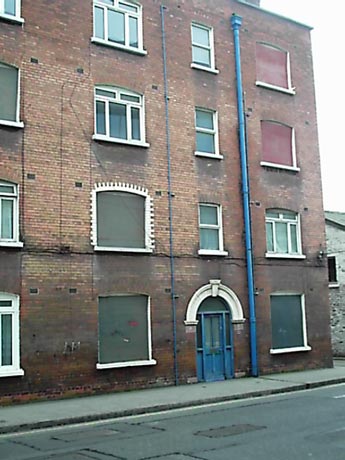 Last week Dublin City Council held their "Conference on Future Directions for Future Housing Policy" in Croke Park. The issue that was of most interest & concern at the conference was the Council's future change in policy to allow tenants of social housing flats to buy their own property.
Last week Dublin City Council held their "Conference on Future Directions for Future Housing Policy" in Croke Park. The issue that was of most interest & concern at the conference was the Council's future change in policy to allow tenants of social housing flats to buy their own property.
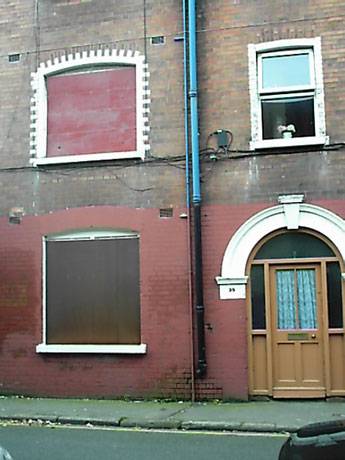
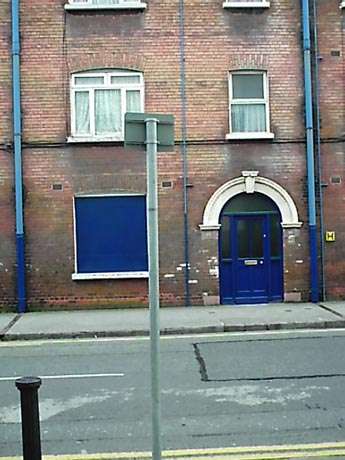
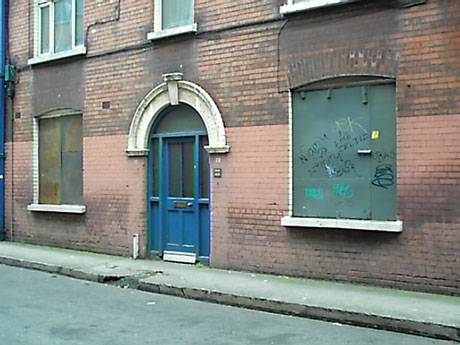
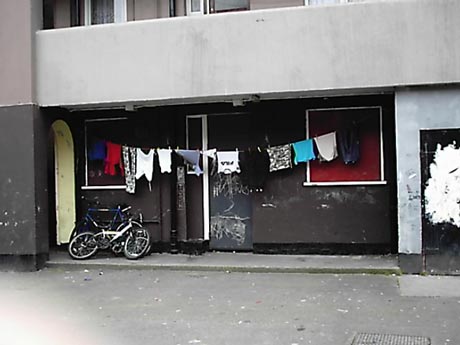
 printable version
printable version

 Digg this
Digg this del.icio.us
del.icio.us Furl
Furl Reddit
Reddit Technorati
Technorati Facebook
Facebook Gab
Gab Twitter
Twitter
View Comments Titles Only
save preference
Comments (14 of 14)
Jump To Comment: 1 2 3 4 5 6 7 8 9 10 11 12 13 14More photos from around Dublin 2, 6, and 8...
.
.
This is the Council notice up on the side of the Basin Street flats in Dublin 8, proclaiming more housing units... loads of the ground floor units were boarded up (bear in mind I didnt take photos of every flat I saw, these photos are repetitive enough as it is...).
SF statements on sell-off:
http://www.politics.ie/modules.php?name=News&file=article&sid=4502
http://www.politics.ie/modules.php?name=News&file=article&sid=6011
Labour statement:
http://www.politics.ie/modules.php?name=News&file=article&sid=6569
Threshold are holding on a seminar on Tuesday 30th November from 10am to 12.30 on Urban Regeneration and Community Involvement- Gresham Hotel, O'Connell Street.
The seminar will review current urban regeneration policy and practice, and look at how local communities can influence the development of their estates.
The seminar will include short presentations by community leaders from St Michaels' Estate, Fatima Mansions and O'Devaney Gardens and by academics from UCD and TCD. The presentation will be followed by workshops.
You will need to book a place at [email protected]
I think Kevin's article makes for a very interesting debate. As a council community worker myself (not Dublin City Council), I still haven't made up on my mind on this one. On the one hand, I would be concerned at the fact that the Council are reducing their own housing stock and the implications this has for both the current and future housing list. I also believe the PPP model has yet to prove itself as a means of delivering sufficient social housing. On the other hand, if you walk through a local authority estate, you can generally tell the difference in appearance between the houses that are rented and those which have been bought out by the tenants from the Council. The estates which have a higher percentage of bought out houses often tend to be more settled, have fewer incidences of anti-social behaviour and there is more pride taken in the area. Given current levels of local government funding and expenditure, I really don't think any local authority is going to make serious money selling its stock.
DCC (and most other councils, apart from Fingal) have failed miserably in their LEGAL RIGHT to claim 20% of all post high court judgement developments (c. 1999) for social and affordable housing - bowing to the "pressures" of the construction industry and property developers. If they had pursued even half of what they are entitled to then they could have easily knocked a large chunk of people off the current housing list. Fingal seem to be the only Council in the state actively operating a decent affordable/shared ownership scheme that works, and its not as if that has affected the rate of building work in the borough in the slightest (AFAIK its the fastest growing "county" population in Ireland)
But somehow the sentimental memories of community will be outweighed by the bad memories and associations.
Once it was a place they said everyone wanted to live in.
Then it was a place they said no-one wanted to live in.
Housing as a social right.:-
Cities of true Security and Peace in Europe are not made by fostering ghettoes on the margins, or by the steady reduction in quality of essential services such as education and infrastructre such as transport to areas of low income. Nor are they made by concentrating of migrant or newly arrived citizens in small areas in pre-speculation. They are made by systematically reducing the lines of division and disparity between wealth and poverty.
Local and municipal authorities in Europe have an obligation to protect their citizens, this does not mean creating the social conditions which require yet more and more police officers with yet more and more body armour. It means building and re-building cities which allow diverse communities themselves microcosms of the greater nation to geow. And as part of that municipal authorities and states must provide services and housing.
The intolerable wrongs of present society trhoughout Europe have been caused by the mistaken belief that the private sector could carry the responsibilities for which the institutions of state were created. The fear felt by our pensioners with no-one to turn to except a television with not enough to face their last days.
The hopelessness felt by those who have grown in ghettoes faced by constant assertions of wealth and prosperity of which they feel no benefit.
Quality of housing determines quality of life. More often than not the sense of alienation from society which is compounded by poor education, poor services, and reduced "prospects" began by living in conditions which are psychologically damaging and limiting. Where the wound has been opened by continuous neglect and each year salt poured in.
Investment in housing of good quality, as in education and educators is of paramount importance to the ending of acquisitive crime, problem drug use and the "ghettoes of no escape".
Any government or public representative who thinks otherwise is so shortsighted or blinkered that they need to spend a year under "house arrest" in a rundown "precint" "estate" project" (whatever name these disastrous attempts to house thousands were called by the flawed sociologist and architectural partnerships that emerged in the post war period).
a € invested in hood housing, with light, space, and proper sense of community, is € invested in society's future, is a € invested in healing the past.
Ireland as one of the richest states in the world ought show the lead in the quality of its housing,
and the maintenance of its housing as much as in education.
Never forget-
The first classroom is your livingroom.
The first geography lesson is learnt on your doorstep.
the first Class-room is your livingroom.
agree with the suggestion by Professor John FitzGerlad of of the Economic and Social Research Institute (ESRI), that owners of 2nd or holiday homes ought pay tax on their investment.
Many of the more well paid of our society enjoy second homes, including Minister Mc Dowell, who's home in Roscommon was recently the scene of a still unestablished incident, when the normally publicity shy minister claimed someone had fired trhough his livingroom windows.
It is unknown how much tax the minister would have to pay on this second home, if the appropriate and just changes to the law were made.
The minister rarely comments on housing issues his last opinions on the issue being made last weekend to the Garda association when he promised to improve the quality of barrack and other job related accomodation for the Gardaí.
his speech-
"houses for gardaí"
http://www.indymedia.ie/newswire.php?story_id=69057&condense_comments=false#comment103191
the article highlighting Prof FitzGerald's suggestion-
http://www.unison.ie/irish_independent/stories.php3?ca=9&si=1362848&issue_id=12237
the poll-
http://www.unison.ie/polls/index.php3?ident=Irish%20Independent&mypollid=1655&vo=1
On some of the rougher estates it is a priority for the council to immediatly board up the property after it has been vacated. This prevents the locals from torching it.
For example, this happens regularly in Corduff, despite the measures taken by the council.
does the last comment mean the boarding up of big swinging mickey Mc Dowell's holiday split level home on the lake of Roscommon might be justified by the local council on the grounds that it might be torched?
stands to reason.
he alledges that someone ("I'm not naming names, but it's SF/IRA!!!!") put a bullet through his windows.
=
write your postcards.
Interesting how you'd be pushed to find such well-built and spacious flats for sale in Dublin now.
That was a very interesting article, Kevin. If the Councils are gearing up to privatise their public housing, we will have to be ready to respond quickly.
In Britain the Councils generally have to hold a tenants vote before they can privatise an estate or area. That gives housing activists an easier route towards stopping a sell off, but it can still be a very uneven battle. Councils can be extremely cunning and resourceful when they are trying to get rid of their responsibilities. They will often starve an area of resources and then promise that acceptance of a sell off will see repairs, maintenance and investment. They are also fond of false "consultation" exercises, where tenants where the only options put forward are all different forms of privatisation or part-privatisation - Housing Associations, PFI, ALMOs and so on. It will be interesting to see if ballots are organised or if a changeover in Dublin will be a decision made only at the top.
Of course a switch to a private landlord, even a non-profit private landlord, means less secure tenancies, higher rents and more evictions for failing to meet rent. It removes the limited democratic accountability which Council elections provide. It also allows a Council to put a stop to the building of new council housing, placing the onus instead on private charitable provision.
The following links may be of interest:
English Socialist Party feature on housing -
http://www.socialistparty.org.uk/2005/390/index.html?id=np4.htm
Clare Daly on the housing crisis -
http://www.socialistparty.net/pub/pages/voicemar04/3.htm
Defend Council Housing -
http://www.defendcouncilhousing.org.uk